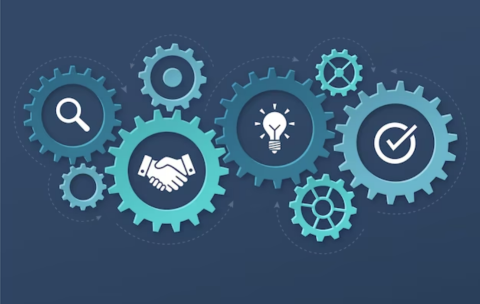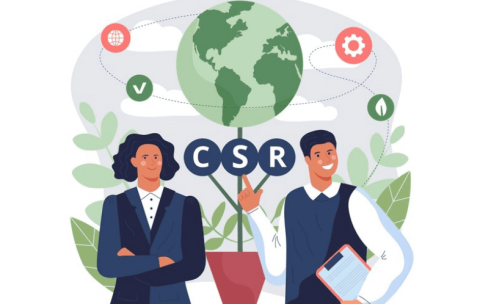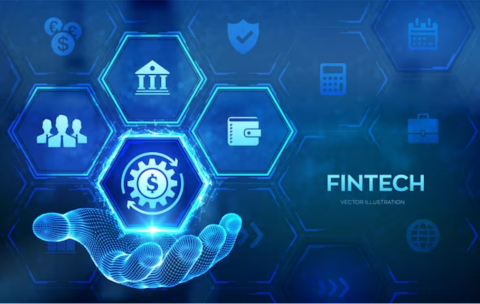Most popular
Introduction to Operations Management
8 Lessons
16 hours
Beginner
What you'll learn
Define and explain the key concepts and terminologies related to Operations Management.
Identify the role and significance of Operations Management within different types of organizations.
Analyze various operations strategies and their impact on business performance.
Evaluate the importance of process design, capacity planning, and quality management.
Apply quantitative techniques and tools to solve operational problems.
Understand the role of technology and innovation in modern Operations Management.
Discuss sustainability and ethical considerations in operations.
Foundations of Marketing
16.5 hours
All Levels
What you'll learn
Understand Marketing Fundamentals: Define marketing and understand its role in the business landscape.
Marketing Mix Mastery: Gain knowledge of the 4 Ps (Product, Price, Place, Promotion) and how to balance them in a marketing plan.
Market Segmentation and Targeting: Learn how to segment the market and target the right audience effectively.
Consumer Behavior Analysis: Understand consumer needs and how they influence marketing strategies.
Brand Positioning: Develop the skill to create and maintain a brand position in the market.
Marketing Research: Introduction to the basics of conducting market research to inform marketing decisions.
Digital Marketing Overview: Get acquainted with digital marketing channels and their role in contemporary marketing strategies.
Marketing Planning and Strategy: Learn how to develop a coherent marketing plan aligned with business objectives.
Measuring Marketing Effectiveness: Understand the key performance indicators (KPIs) for measuring the success of marketing activities.
Ethics in Marketing: Recognize the importance of ethical considerations in marketing practices.
Change Management
20 hours
Beginner
What you'll learn
Week 1-2: Introduction to Change Management
Fundamentals of change management
Understanding why change happens and how it impacts organizations
The role of a change manager
Week 3-4: Theories and Models of Change
Overview of key change management theories (e.g., Lewin’s Change Model, Kotter’s 8-Step Change Model)
Analyzing different change management models and their applications
Week 5-6: Planning for Change
Developing effective change management strategies
Stakeholder analysis and engagement in change processes
Communication strategies for change
Week 7-8: Implementing Change
Execution of change initiatives
Overcoming challenges and obstacles in change implementation
Monitoring and controlling change processes
Week 9-10: Dealing with Resistance to Change
Understanding the root causes of resistance
Strategies for managing and mitigating resistance
Importance of empathy and communication in overcoming resistance
Week 11-12: Change and Organizational Culture
Impact of organizational culture on change
Aligning change initiatives with organizational values and culture
Cultural change and transformation
Week 13-14: Leading Change
Leadership styles and their impact on change management
Building and leading effective change teams
Personal and professional skills for change leaders
Week 15: Course Review and Final Assessment
Course Materials and Assessment:
Study Materials: Detailed notes, case studies, video lectures, and recommended readings.
Quizzes/Case Studies: Regular quizzes and case studies to reinforce concepts and apply learning.
MCQs: Multiple choice questions focusing on key topics for theoretical understanding.
Simulations: Interactive simulations for experiencing real-life change management scenarios.
Final Project: Developing a comprehensive change management plan for a real or hypothetical organization.
Nonprofit Governance and Leadership
1 hour
All Levels
What you'll learn
Understand the unique characteristics and purpose of nonprofit organizations.
Explore the role and responsibilities of nonprofit boards in governance.
Identify key principles of effective nonprofit leadership.
Analyze the relationship between governance, leadership, and organizational success.
Learn about legal and ethical considerations in nonprofit governance.
Examine strategies for building and sustaining a strong board of directors.
Understand the importance of transparency and accountability in nonprofit operations.
Explore the challenges and opportunities in nonprofit leadership.
Analyze case studies showcasing successful nonprofit governance models.
Develop a basic understanding of nonprofit financial management.
Luxury Brand Management
20 hours
Beginner
What you'll learn
Week 1-2: Introduction to Luxury Brand Management
Defining luxury and understanding the luxury market
History and evolution of luxury brands
Characteristics of luxury products and services
Week 3-4: Consumer Behavior in Luxury Markets
Psychology of Luxury Consumers
Segmentation and targeting strategies for luxury brands
Consumer trends and insights in luxury markets
Week 5-6: Brand Positioning and Identity in Luxury
Developing a luxury brand identity
Positioning strategies for luxury brands
Case studies of successful luxury brand positioning
Week 7-8: Marketing and Communication for Luxury Brands
Marketing mix for luxury brands
Digital marketing and social media strategies for luxury
Public relations and event management in luxury
Week 9-10: Retail and Distribution Strategies in Luxury
Retail experience in luxury brand management
Distribution channels and managing exclusivity
Omni-channel strategies for luxury retail
Week 11-12: Product Development and Innovation in Luxury
Product design and development processes in luxury
Balancing tradition and innovation
Collaborations and co-branding in luxury
Week 13-14: Sustainability and Ethics in Luxury Brands
Sustainable practices in luxury brand management
Ethical challenges and corporate social responsibility
Impact of sustainability on luxury brand image
Week 15: Course Review and Final Assessment
Course Materials and Assessment:
Study Materials: Comprehensive lecture notes, case studies, video tutorials, and essential readings.
Quizzes/Case Studies: Regular quizzes and case studies for practical application of luxury brand management concepts.
MCQs: Multiple choice questions to assess understanding of luxury brand management principles.
Simulations: Interactive simulations related to luxury brand scenarios for experiential learning.
Final Project: Developing a luxury brand strategy or conducting a market analysis for a luxury brand.
International Trade Policies and Regulations
18.5 hours
All Levels
What you'll learn
Basics of International Trade: Understanding the fundamental concepts and importance of international trade.
Trade Policies: Explore different types of trade policies and their impacts on international business.
Regulatory Frameworks: Understanding the international regulatory frameworks that govern global trade.
Trade Agreements: Study various international trade agreements and their roles.
Tariffs and Non-Tariff Barriers: Examine the use and impact of tariffs and non-tariff barriers in trade.
Global Trade Organizations: Learn about the role of global trade organizations like the WTO.
Economic Integration: Understand different forms of economic integration and their implications for trade.
Trade Ethics and Standards: Discuss the ethical considerations and standards in international trade.
Emerging Trends: Analyze current trends and future directions in international trade policies.
Compliance and Enforcement: Learn about compliance with trade policies and enforcement mechanisms.
Brand Management
20 hours
Beginner
What you'll learn
Week 1-2: Introduction to Brand Management
Understanding the concept and importance of branding
Evolution of brand management
The strategic role of brands in business
Week 3-4: Building Brand Equity
Elements of brand equity
Strategies for building and enhancing brand equity
Measuring brand equity
Week 5-6: Brand Positioning and Identity
Developing a brand positioning strategy
Brand identity and image
Case studies on successful brand positioning
Week 7-8: Brand Marketing and Communication
Integrated marketing communications for brands
Brand storytelling and content marketing
Digital and social media strategies for brand marketing
Week 9-10: Consumer Behavior and Brand Loyalty
Understanding consumer behavior in branding
Strategies for building and maintaining brand loyalty
Analyzing customer-brand relationships
Week 11-12: Global Branding Strategies
Challenges and strategies for branding in global markets
Cultural considerations in global brand management
Case studies on global branding successes and failures
Week 13-14: Managing Brand Portfolio and Brand Extensions
Strategies for Brand Portfolio Management
Brand extensions and co-branding strategies
Managing brand dilution and revitalizing brands
Week 15: Course Review and Final Assessment
Course Materials and Assessment:
Study Materials: Detailed lecture notes, case studies, video tutorials, and recommended readings.
Quizzes/Case Studies: Regular quizzes and case studies focusing on practical application of brand management theories.
MCQs: Multiple choice questions to evaluate understanding of key brand management concepts.
Simulations: Brand management simulations for hands-on experience in real-world scenarios.
Final Project: Developing a comprehensive brand strategy for a real or hypothetical product/service.
Strategic Leadership
20 hours
Beginner
What you'll learn
Week 1-2: Foundations of Strategic Leadership
Understanding the role and importance of strategic leadership
Differences between leadership and management
Core leadership theories and their application in strategic contexts
Week 3-4: Vision, Mission, and Strategic Decision Making
Developing and communicating a clear vision and mission
Strategic decision-making processes
Balancing short-term and long-term strategic objectives
Week 5-6: Leading Organizational Change and Transformation
Theories and models of organizational change
Leading and managing change initiatives
Overcoming resistance and fostering a culture of change
Week 7-8: Strategic Communication and Stakeholder Management
Effective communication strategies for leaders
Engaging and managing stakeholders
Crisis communication and reputation management
Week 9-10: Innovation and Strategic Thinking
Fostering innovation and creativity in organizations
Tools and techniques for strategic thinking and analysis
Adapting to market changes and disruptions
Week 11-12: Ethical Leadership and Corporate Social Responsibility
Ethical dilemmas in leadership
Corporate social responsibility and sustainable leadership practices
Building an ethical organizational culture
Week 13-14: Developing Leadership Capabilities
Self-assessment and development of leadership skills
Building and leading high-performance teams
Succession planning and leadership development
Week 15: Course Review and Final Assessment
Course Materials and Assessment:
Study Materials: In-depth notes, case studies, video lectures, and essential readings.
Quizzes/Case Studies: Weekly quizzes and case studies to reinforce concepts and practical application.
MCQs: Multiple choice questions to test theoretical knowledge and understanding.
Simulations: Interactive leadership simulations for experiential learning.
Final Project: Analysis and presentation of a strategic leadership plan for a real or hypothetical organization.
The Evolution of Corporate Social Responsibility (CSR)
2 hours
All Levels
What you'll learn
Understand the concept and definition of Corporate Social Responsibility (CSR).
Trace the historical evolution of CSR from its origins to the present day.
Recognize the key drivers that have shaped the development of CSR.
Explore the impact of CSR on business sustainability and reputation.
Identify the role of stakeholders in influencing CSR initiatives.
Analyze real-world case studies illustrating successful CSR practices.
Discuss the challenges and criticisms faced by companies in implementing CSR.
Examine the relationship between CSR and ethical business practices.
Assess the global trends and standards in corporate social responsibility.
Develop a basic framework for implementing CSR in a business context.
Trending
International Finance
20 hours
Beginner
What you'll learn
Week 1-2: Introduction to International Finance
Overview of the global financial environment
The importance of international finance in business
Foreign exchange markets and exchange rate mechanisms
Week 3-4: Foreign Exchange Risk Management
Types of foreign exchange risk
Hedging strategies using forward, futures, options, and swaps
Currency risk management in multinational corporations
Week 5-6: International Financial Markets and Institutions
Overview of international financial markets
Role and functions of international financial institutions (e.g., IMF, World Bank)
Global debt and equity markets
Week 7-8: International Capital Budgeting
Principles of capital budgeting in an international context
Evaluating foreign investment opportunities
Adjusting for political and economic risks
Week 9-10: Financing International Trade
Methods and instruments of international trade financing
Letters of credit, trade finance, and export-import financing
Understanding trade agreements and their financial implications
Week 11-12: Global Portfolio Management
Diversification benefits of international investments
Risks and returns of global portfolios
Asset allocation and international portfolio strategies
Week 13-14: Current Issues in International Finance
Contemporary challenges and trends in international finance
Impact of globalization on financial decision-making
Analysis of current global financial crises and policy responses
Week 15: Course Review and Final Assessment
Course Materials and Assessment:
Study Materials: Comprehensive lecture notes, detailed case studies, video lectures, and essential readings.
Quizzes/Case Studies: Weekly quizzes and real-world case studies for practical understanding of international finance concepts.
MCQs: Multiple choice questions to assess students' grasp of international financial theories and principles.
Simulations: Interactive financial simulations and exercises for experiential learning in a global finance setting.
Final Project: Development of an international financial analysis report, involving foreign investment appraisal, risk analysis, and strategic financial planning.
Global Entrepreneurship Trends
1 Lesson
18.5 hours
Beginner
What you'll learn
Understand the dynamics of the global entrepreneurship landscape, including trends and challenges.
Explore the impact of emerging technologies on entrepreneurial ventures worldwide.
Analyze the influence of cross-cultural factors on entrepreneurial decision-making.
Assess global funding and investment trends shaping the entrepreneurial ecosystem.
Examine the role of government policies and regulations in shaping global entrepreneurship.
Develop skills for global networking and collaboration in the entrepreneurial context.
Explore trends in social entrepreneurship and its contribution to addressing global challenges.
Energy Management
20 hours
Beginner
What you'll learn
Week 1-2: Introduction to Energy Management
Overview of the global energy landscape
Key concepts in energy production, distribution, and consumption
Energy sector's impact on the economy and environment
Week 3-4: Energy Economics and Markets
Principles of energy economics
Structure and dynamics of energy markets
Pricing mechanisms and factors influencing energy prices
Week 5-6: Renewable Energy Sources and Technologies
Overview of renewable energy sources (solar, wind, hydro, geothermal)
Technological advancements in renewable energy
Integration of renewable energy into existing energy systems
Week 7-8: Energy Policy and Regulation
Role of government in energy management
Analysis of energy policies and regulatory frameworks
Global trends and variations in energy policy
Week 9-10: Energy Efficiency and Conservation
Strategies for improving energy efficiency
Energy conservation techniques in industrial and commercial sectors
Role of energy management systems and standards (e.g., ISO 50001)
Week 11-12: Sustainability in Energy Management
Sustainable energy practices and their business implications
Environmental impact assessment and mitigation
Corporate social responsibility in the energy sector
Week 13-14: Innovations and Future Trends in Energy Management
Emerging technologies in energy management (e.g., smart grids, energy storage)
The future of energy: challenges and opportunities
Case studies of innovative energy management practices
Week 15: Course Review and Final Assessment
Course Materials and Assessment:
Study Materials: Comprehensive lecture notes, case studies, video tutorials, and essential readings.
Quizzes/Case Studies: Regular quizzes and case studies for practical application of energy management concepts.
MCQs: Multiple choice questions to test understanding of energy management principles.
Simulations: Interactive simulations for practical experience in energy management scenarios.
Final Project: Developing an energy management strategy or conducting a case study analysis on energy initiatives.
Foundations of Marketing
16.5 hours
All Levels
What you'll learn
Understand Marketing Fundamentals: Define marketing and understand its role in the business landscape.
Marketing Mix Mastery: Gain knowledge of the 4 Ps (Product, Price, Place, Promotion) and how to balance them in a marketing plan.
Market Segmentation and Targeting: Learn how to segment the market and target the right audience effectively.
Consumer Behavior Analysis: Understand consumer needs and how they influence marketing strategies.
Brand Positioning: Develop the skill to create and maintain a brand position in the market.
Marketing Research: Introduction to the basics of conducting market research to inform marketing decisions.
Digital Marketing Overview: Get acquainted with digital marketing channels and their role in contemporary marketing strategies.
Marketing Planning and Strategy: Learn how to develop a coherent marketing plan aligned with business objectives.
Measuring Marketing Effectiveness: Understand the key performance indicators (KPIs) for measuring the success of marketing activities.
Ethics in Marketing: Recognize the importance of ethical considerations in marketing practices.
Mergers and Acquisitions
20 hours
Beginner
What you'll learn
Week 1-2: Introduction to Mergers and Acquisitions
Overview of M&A and its role in corporate strategy
Types of M&A transactions (mergers, acquisitions, consolidations, tender offers)
Historical trends and drivers of M&A activity
Week 3-4: M&A Strategy and Planning
Strategic rationale for M&A
Identifying and evaluating M&A targets
Synergies and value creation in M&A
Week 5-6: Valuation in M&A
Valuation methods for M&A (DCF, comparables, precedents)
Financial modeling and analysis in M&A
Due diligence process
Week 7-8: Financing Mergers and Acquisitions
Financing options for M&A transactions
Leveraged buyouts and private equity
Deal structuring and negotiation techniques
Week 9-10: Legal and Regulatory Considerations
Legal framework governing M&A
Regulatory approvals and antitrust considerations
Cross-border M&A and international regulations
Week 11-12: M&A Integration and Post-Merger Management
Challenges in integrating merged entities
Strategies for successful post-merger integration
Managing cultural and operational integration
Week 13-14: Case Studies and Current Trends in M&A
Analysis of recent high-profile M&A deals
Lessons learned from successful and failed M&A transactions
Emerging trends and future outlook in M&A
Week 15: Course Review and Final Assessment
Course Materials and Assessment:
Study Materials: Comprehensive lecture notes, case studies, video tutorials, and essential readings.
Quizzes/Case Studies: Regular quizzes and case studies for practical application of M&A concepts.
MCQs: Multiple choice questions to test understanding of M&A principles and practices.
Simulations: Interactive M&A simulations for experiential learning.
Final Project: Developing an M&A strategy or conducting a case study analysis on a notable M&A transaction.
Fintech (Financial Technology)
20 hours
Beginner
What you'll learn
Week 1-2: Introduction to Fintech
Overview of the fintech industry
History and evolution of financial technology
Key players and ecosystems in fintech
Week 3-4: Digital Payments and Currencies
Understanding digital payment systems
Evolution and impact of digital currencies
Mobile payments and wallet technologies
Week 5-6: Blockchain Technology and Cryptocurrencies
Fundamentals of blockchain technology
Cryptocurrencies: Bitcoin, Ethereum, and others
Use cases and implications of blockchain
Week 7-8: Robo-Advising and Algorithmic Trading
Principles of robot-advising in wealth management
Algorithmic and high-frequency trading
Impact of AI and machine learning on trading
Week 9-10: Peer-to-Peer Lending and Crowdfunding
Mechanisms of peer-to-peer lending platforms
Crowdfunding models and platforms
Regulatory and risk considerations
Week 11-12: Insurtech and Regtech
Technology in insurance: trends and innovations
Regulatory technology (Regtech) in finance
Compliance, reporting, and risk management tools
Week 13-14: Future Trends in Fintech
Emerging technologies in fintech (e.g., AI, IoT, big data)
Fintech and financial inclusion
Predictions for the future of financial services
Week 15: Course Review and Final Assessment
Course Materials and Assessment:
Study Materials: Detailed lecture notes, case studies, interactive video lectures, and essential readings.
Quizzes/Case Studies: Regular quizzes and real-world case studies to apply fintech concepts.
MCQs: Multiple choice questions to evaluate understanding of fintech principles and technologies.
Simulations: Financial technology simulations for hands-on experience in a virtual environment.
Final Project: Analysis of a fintech innovation or the development of a fintech business plan.
Renewable Energy Technologies
16.5 hours
All Levels
What you'll learn
Understanding Renewable Energy: Grasp basic concepts and the importance of renewable energy.
Types of Renewable Energy: Explore different types, such as solar, wind, hydro, and biomass.
Technology Behind Renewable Energy: Understand the technological principles of renewable energy systems.
Economic Aspects: Analyze the economic implications and business models related to renewable energy.
Environmental Impact: Learn about the environmental benefits and sustainability aspects.
Policy and Regulatory Frameworks: Study government policies and regulations impacting renewable energy.
Innovation in Renewable Technologies: Examine recent innovations and advancements in the field.
Challenges and Barriers: Understand the challenges in adopting renewable energy technologies.
Case Studies: Review real-world examples of successful renewable energy projects.
Future Trends: Discuss emerging trends and the future scope in renewable energy.
Data Science and Analytics
20 hours
Beginner
What you'll learn
Week 1-2: Introduction to Data Science and Business Analytics
The role of data science in business
Overview of the data science process
Key concepts in data analytics
Week 3-4: Data Management and Preprocessing
Data collection and integration techniques
Data cleaning and preprocessing
Introduction to database management and SQL
Week 5-6: Descriptive and Inferential Statistics
Basics of descriptive statistics
Inferential statistics and hypothesis testing
Using statistical software for data analysis (e.g., R, Python)
Week 7-8: Predictive Analytics and Machine Learning
Introduction to predictive modeling
Supervised and unsupervised learning techniques
Implementing machine learning algorithms
Week 9-10: Data Visualization and Reporting
Principles of effective data visualization
Tools for data visualization (e.g., Tableau, Power BI)
Communicating data insights to stakeholders
Week 11-12: Big Data and Advanced Analytics Techniques
Understanding big data technologies and frameworks
Advanced analytics techniques (e.g., text analytics, neural networks)
Case studies in big data analytics
Week 13-14: Ethical and Legal Considerations in Data Science
Data privacy and security issues
Ethical considerations in data analytics
Regulatory compliance in data science
Week 15: Course Review and Final Assessment
Course Materials and Assessment:
Study Materials: Detailed lecture notes, case studies, video tutorials, and recommended readings.
Quizzes/Case Studies: Weekly quizzes and case studies to apply data science concepts in business contexts.
MCQs: Multiple choice questions to evaluate understanding of data science principles.
Simulations: Interactive data science simulations for practical, hands-on experience.
Final Project: Conducting a comprehensive data analytics project, from data collection to interpretation and presentation of findings.
Introduction to Corporate Finance
18 hours
All Levels
What you'll learn
Understand the Role of Corporate Finance: Define corporate finance and understand its significance in the corporate structure.
Grasp the Concept of Financial Statements: Learn how to interpret balance sheets, income statements, and cash flow statements.
Identify Sources of Business Financing: Explore various financing options for businesses, including debt, equity, and internal financing.
Assess Investment Decisions with Capital Budgeting: Introduce the principles of capital budgeting and understand different investment appraisal methods.
Learn the Time Value of Money (TVM): Understand the basic principles of TVM and its application in corporate finance.
Understand Risk and Return: Learn how to measure risk and its relationship to expected returns.
Explore the Weighted Average Cost of Capital (WACC): Gain an understanding of how companies assess the cost of capital.
Learn about Dividend Policy: Introduce various theories related to dividend policies and their practical implications.
Valuation of Securities: Learn the basics of valuing stocks and bonds.
Examine the Mergers & Acquisitions (M&A) Process: Provide an overview of the M&A process, including due diligence and valuation.
Featured Courses
The Evolution of Corporate Social Responsibility (CSR)
2 hours
All Levels
What you'll learn
Understand the concept and definition of Corporate Social Responsibility (CSR).
Trace the historical evolution of CSR from its origins to the present day.
Recognize the key drivers that have shaped the development of CSR.
Explore the impact of CSR on business sustainability and reputation.
Identify the role of stakeholders in influencing CSR initiatives.
Analyze real-world case studies illustrating successful CSR practices.
Discuss the challenges and criticisms faced by companies in implementing CSR.
Examine the relationship between CSR and ethical business practices.
Assess the global trends and standards in corporate social responsibility.
Develop a basic framework for implementing CSR in a business context.
Nonprofit Governance and Leadership
1 hour
All Levels
What you'll learn
Understand the unique characteristics and purpose of nonprofit organizations.
Explore the role and responsibilities of nonprofit boards in governance.
Identify key principles of effective nonprofit leadership.
Analyze the relationship between governance, leadership, and organizational success.
Learn about legal and ethical considerations in nonprofit governance.
Examine strategies for building and sustaining a strong board of directors.
Understand the importance of transparency and accountability in nonprofit operations.
Explore the challenges and opportunities in nonprofit leadership.
Analyze case studies showcasing successful nonprofit governance models.
Develop a basic understanding of nonprofit financial management.
Sustainable Business Models
2 hours
All Levels
What you'll learn
Understanding Sustainable Business Models:
Define sustainable business models and their importance in contemporary business.
Explore the triple bottom line approach (people, planet, profit) in sustainable business.
Key Principles of Sustainable Business:
Identify the key principles and characteristics of sustainable business models.
Understand the integration of social, environmental, and economic considerations.
Sustainable Innovation and Product Design:
Explore how sustainable business models drive innovation.
Understand sustainable product design and its impact on the market.
Circular Economy and Resource Efficiency:
Introduce the concept of a circular economy in sustainable business.
Discuss strategies for resource efficiency and waste reduction.
Ethical and Social Responsibility in Business:
Explore the ethical considerations and social responsibility in sustainable business practices.
Discuss the role of businesses in addressing social and environmental issues.
Case Studies of Successful Sustainable Business Models:
Analyze real-world case studies showcasing successful implementation of sustainable business models.
Extract lessons and insights from these cases.
Sustainable Supply Chain Integration:
Discuss how sustainable practices extend into the supply chain.
Understand the importance of sustainable sourcing and procurement.
Green Marketing and Consumer Behavior:
Explore green marketing strategies in sustainable business.
Understand how consumer behavior influences the success of sustainable products.
Measuring and Reporting Sustainability Performance:
Identify key metrics for measuring sustainability performance in business.
Discuss the importance of transparent reporting in sustainable business.
Developing a Sustainable Business Plan:
Learn how to develop a sustainable business plan.
Understand the elements and considerations for integrating sustainability into business strategy.
Sustainable Supply Chain Practices
2 hours
All Levels
What you'll learn
Understand the concept and importance of sustainable supply chain management.
Explore key principles and practices of sustainable sourcing and procurement.
Identify strategies for reducing environmental impact and promoting eco-friendly practices in the supply chain.
Learn about social responsibility and ethical considerations in supply chain decision-making.
Understand the role of circular economy principles in sustainable supply chain practices.
Explore the benefits of collaboration and transparency in building a sustainable supply chain.
Analyze case studies showcasing successful implementation of sustainable supply chain practices.
Learn about measuring and reporting sustainability performance in the supply chain.
Explore innovation and technology applications for enhancing sustainability in the supply chain.
Develop a basic framework for integrating sustainability into supply chain operations.
Global Market Entry Strategies
2 hours
Beginner
What you'll learn
Understanding Global Market Entry:
Define global market entry and its significance for businesses.
Explore the key factors influencing the decision to enter global markets.
Types of Market Entry Strategies:
Identify and analyze various market entry strategies.
Understand the differences between exporting, licensing, franchising, joint ventures, and wholly-owned subsidiaries.
Cultural and Regulatory Considerations:
Explore the cultural and regulatory factors impacting global market entry.
Understand how businesses adapt strategies to different cultural and legal environments.
Market Research and Analysis:
Discuss the importance of thorough market research and analysis in global market entry.
Identify key considerations for assessing the feasibility of entering specific markets.
Risk Management in Global Expansion:
Understand the risks associated with global market entry.
Explore strategies for mitigating risks and ensuring successful market penetration.
Case Studies of Successful Market Entries:
Analyze real-world case studies of successful global market entry strategies.
Extract lessons and insights from these cases.
Strategic Alliances and Partnerships:
Explore the role of strategic alliances and partnerships in global market entry.
Discuss collaborative approaches to entering new markets.
Adapting Marketing Strategies:
Discuss how businesses adapt marketing strategies for global market entry.
Explore localization and customization of marketing efforts.
Technology and Global Market Entry:
Understand how technology facilitates global market entry.
Explore the role of e-commerce and digital platforms in reaching international audiences.
Developing a Global Market Entry Plan:
Learn how to develop a comprehensive global market entry plan.
Understand the essential components and steps for successful international expansion.
Omnichannel Retailing Strategies
2 hours
All Levels
What you'll learn
Understand the concept of omnichannel retailing and its significance in the modern retail landscape.
Explore key omnichannel strategies, including seamless customer experience and integrated sales channels.
Identify the role of technology in enabling omnichannel retailing.
Learn about data-driven decision-making in omnichannel strategies.
Understand the challenges and opportunities associated with implementing omnichannel approaches.
Explore successful case studies of companies implementing effective omnichannel strategies.
Analyze the impact of omnichannel retailing on customer loyalty and brand reputation.
Learn about inventory management and fulfillment in the context of omnichannel operations.
Understand the role of social media and online platforms in omnichannel marketing.
Develop a basic framework for implementing omnichannel retailing in a business context.
Product Management
2 hours
All Levels
What you'll learn
Understand the fundamentals of Agile methodology and its application in product management.
Explore key Agile principles and how they differ from traditional project management.
Identify the roles and responsibilities within an Agile product management team.
Learn the agile product development lifecycle and iterative planning.
Familiarize yourself with popular Agile frameworks such as Scrum and Kanban.
Understand the importance of customer feedback and continuous improvement in Agile.
Explore effective communication and collaboration practices in Agile teams.
Learn how to create and manage a product backlog in an Agile environment.
Understand the concept of Minimum Viable Product (MVP) and its role in Agile product development.
Develop a basic understanding of metrics and key performance indicators (KPIs) in Agile product management.
Popular Topics
Popular Instructors
All Lesson Plan Courses
Select Categories
Iks Menu
Cannot get WordPress menu (id = 2270)
Filter by
Instructor
Language
We found 59 courses available for you
What you'll learn
Understand the fundamentals of Agile methodology and its application in product management.
Explore key Agile principles and how they differ from traditional project management.
Identify the roles and responsibilities within an Agile product management team.
Learn the agile product development lifecycle and iterative planning.
Familiarize yourself with popular Agile frameworks such as Scrum and Kanban.
Understand the importance of customer feedback and continuous improvement in Agile.
Explore effective communication and collaboration practices in Agile teams.
Learn how to create and manage a product backlog in an Agile environment.
Understand the concept of Minimum Viable Product (MVP) and its role in Agile product development.
Develop a basic understanding of metrics and key performance indicators (KPIs) in Agile product management.


























